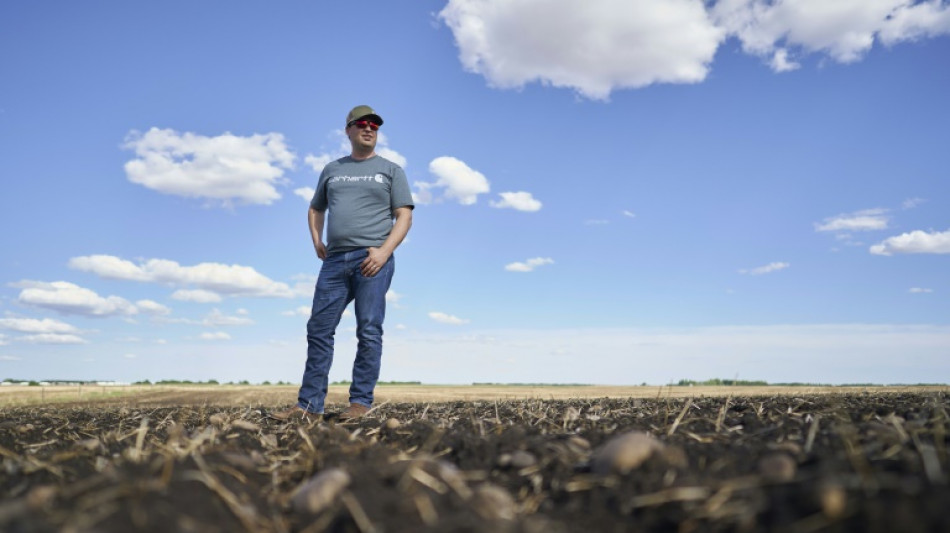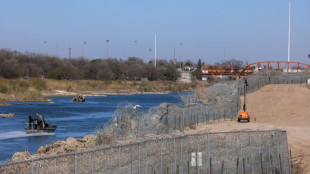
-
 Mbappe can be Real Madrid 'legend' like Ronaldo: Ancelotti
Mbappe can be Real Madrid 'legend' like Ronaldo: Ancelotti
-
Saka 'ready to go' for Arsenal after long injury lay-off: Arteta

-
 Aston Martin to sell stake in Formula One team
Aston Martin to sell stake in Formula One team
-
Three talking points ahead of clay-court season

-
 French court hands Le Pen five-year election ban
French court hands Le Pen five-year election ban
-
Probe accuses ex J-pop star Nakai of sexual assault

-
 Japan leads hefty global stock market losses on tariff woes
Japan leads hefty global stock market losses on tariff woes
-
Saka 'ready to go' after long injury lay-off: Arteta

-
 Ingebrigtsen Sr, on trial for abusing Olympic champion, says he was 'overly protective'
Ingebrigtsen Sr, on trial for abusing Olympic champion, says he was 'overly protective'
-
Tourists and locals enjoy 'ephemeral' Tokyo cherry blossoms

-
 Khamenei warns of 'strong' response if Iran attacked
Khamenei warns of 'strong' response if Iran attacked
-
France fines Apple 150 million euros over privacy feature

-
 UK PM urges nations to smash migrant smuggling gangs 'once and for all'
UK PM urges nations to smash migrant smuggling gangs 'once and for all'
-
Thai authorities probe collapse at quake-hit construction site

-
 France's Le Pen convicted in fake jobs trial
France's Le Pen convicted in fake jobs trial
-
Chinese tech giant Huawei says profits fell 28% last year

-
 Trump says confident of TikTok deal before deadline
Trump says confident of TikTok deal before deadline
-
Myanmar declares week of mourning as hopes fade for quake survivors

-
 Japan's Nikkei leads hefty market losses, gold hits record
Japan's Nikkei leads hefty market losses, gold hits record
-
Tears in Taiwan for relatives hit by Myanmar quake

-
 Venezuela says US revoked transnational oil, gas company licenses
Venezuela says US revoked transnational oil, gas company licenses
-
'Devastated': Relatives await news from Bangkok building collapse

-
 Arsenal, Tottenham to play pre-season North London derby in Hong Kong
Arsenal, Tottenham to play pre-season North London derby in Hong Kong
-
Japan's Nikkei leads hefty equity market losses; gold hits record

-
 Israel's Netanyahu picks new security chief, defying legal challenge
Israel's Netanyahu picks new security chief, defying legal challenge
-
Trump says US tariffs to hit 'all countries'

-
 Prayers and tears for Eid in quake-hit Mandalay
Prayers and tears for Eid in quake-hit Mandalay
-
After flops, movie industry targets fresh start at CinemaCon

-
 Tsunoda targets podium finish in Japan after 'unreal' Red Bull move
Tsunoda targets podium finish in Japan after 'unreal' Red Bull move
-
French chefs await new Michelin guide

-
 UK imposes travel permit on Europeans from Wednesday
UK imposes travel permit on Europeans from Wednesday
-
At his academy, Romanian legend Hagi shapes future champions

-
 Referee's lunch break saved Miami winner Mensik from early exit
Referee's lunch break saved Miami winner Mensik from early exit
-
Djokovic refuses to discuss eye ailment after shock Miami loss

-
 Mitchell magic as Cavs bag 60th win, Pistons and T'Wolves brawl
Mitchell magic as Cavs bag 60th win, Pistons and T'Wolves brawl
-
Mensik shocks Djokovic to win Miami Open

-
 Duterte lawyer: 'compelling' grounds to throw case out
Duterte lawyer: 'compelling' grounds to throw case out
-
What happens on Trump's 'Liberation Day' and beyond?

-
 Clock ticks on Trump's reciprocal tariffs as countries seek reprieve
Clock ticks on Trump's reciprocal tariffs as countries seek reprieve
-
Japan-Australia flagship hydrogen project stumbles

-
 Musk deploys wealth in bid to swing Wisconsin court vote
Musk deploys wealth in bid to swing Wisconsin court vote
-
Mensik upsets Djokovic to win Miami Open

-
 China manufacturing activity grows at highest rate in a year
China manufacturing activity grows at highest rate in a year
-
'Waited for death': Ex-detainees recount horrors of Sudan's RSF prisons

-
 Japan's Nikkei leads big losses in Asian markets as gold hits record
Japan's Nikkei leads big losses in Asian markets as gold hits record
-
Rescue hopes fading three days after deadly Myanmar quake

-
 'Basketbrawl' as seven ejected in Pistons-Wolves clash
'Basketbrawl' as seven ejected in Pistons-Wolves clash
-
Four men loom large in Microsoft history

-
 Computer pioneer Microsoft turns 50 in the age of AI
Computer pioneer Microsoft turns 50 in the age of AI
-
Trump calls out both Putin and Zelensky over ceasefire talks


Canadian Prairies farmers try to adapt to a warming world
Following repeated droughts, Canadian farmers are trying to adapt to a new era in agriculture marked by a warming world -- including by trapping snow in their fields, planting heat-resistant crops and seeding earlier in the season.
But it's unclear, they are the first to admit, if their slogging will bear fruit.
Squatting in the middle of a canola field in Alberta, on the western edge of Canada's vast Prairies region, Ian Chitwood surveys the shoots sprouting between long furrows of black soil.
His battle with the heat has been starting earlier every year.
By planting his crops earlier in the season, in May, Chitwood aims to "move up the flowering window," during which the plants are most vulnerable, in order to protect them from the heat in June.
But what his crops really need in the wake of a devastating drought in 2021, he acknowledges, is mild weather and humid soil.
That drought was a "once in 100 years event," says Curtis Rempel of the Canola Council of Canada.
That year, the west of the country sweltered under record high summer temperatures, with the mercury reaching 49.6 degrees Celsius (121.3 Fahrenheit).
"It sure had an impact on yields," reducing them by 50 percent, according to Rempel.
Such hits have had significant impacts on international markets, as Canada exports 90 percent of its canola harvest -- used mostly for cooking oil and biodiesel fuel.
- Water management -
Most canola crops are grown without requiring irrigation in the Prairies, the nation's agricultural heartland spanning nearly 1.8 million square kilometers (695,000 square miles). But the region is sensitive to droughts, whose frequency and severity have been steadily increasing.
In this region, explains Phillip Harder, a hydrology researcher at the University of Saskatchewan, in Saskatoon, "crop production relies on water that accumulates throughout the year." In other words, snow that accumulates over winter and soaks into the ground during the spring thaw.
But howling winds over fields that stretch as far as the eye can see have been blowing away much of that snow of late.
Some farmers have turned to a century-old solution of planting trees in and around their fields to trap the snow.
"In the wintertime when the snow blows it catches in the trees, and then it slowly soaks into the ground," explains Stuart Dougan, a 69-year-old farmer with a weather-beaten face.
In the spring and summer, the trees provide further shelter from the wind "so it's not taking the moisture from the crops," he adds.
Trees may pose new challenges, however, as modern agricultural equipment is much bulkier than in the 1930s when one could more easily plow around a tree trunk, points out Harder.
Alternatively, he recommends when harvesting crops to cut the plants higher on the stem, leaving longer "stubble" sticking out of the ground to "increase snow retention."
- Turning to science -
"We've always looked to keep as much stubble in place to catch the snow and reduce evaporation rates," says Saskatchewan farmer Rob Stone. He, like many Canadian farmers, stopped plowing his fields in the 1990s for this very purpose.
He's now experimenting with new genetically modified seeds that he says hold hope for the future of canola. Four small flags in the middle of his fields mark a test crop.
"As we find ones that are more tolerant (to heat), we will crossbreed them to make a new (plant) population," explains Greg Gingera, a genetics researcher.
Also in the works, adds Rempel, are several companies looking to develop "biologicals or bacteria or fungi that you add to the soil or spray on top of the plant to confer stress tolerance."
But it will be seven to eight years before a product is likely ready to be commercialized and widely available, he says.
In the meantime, farmers will have to make do.
L.Harper--AMWN



